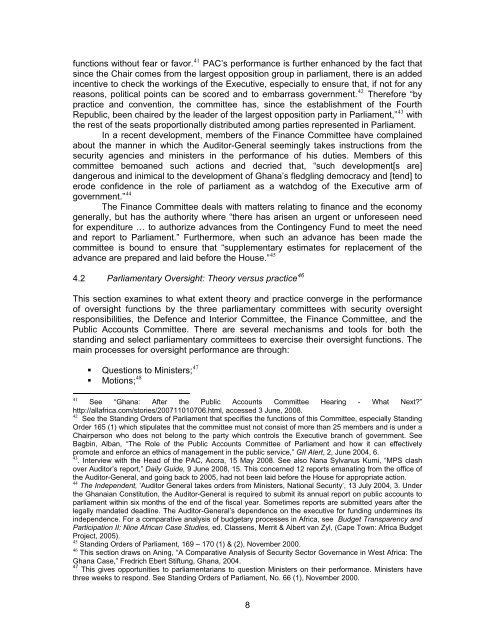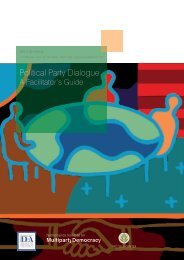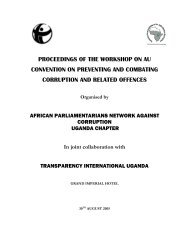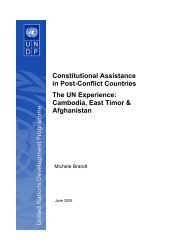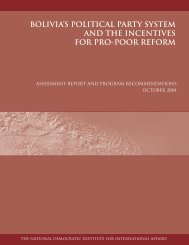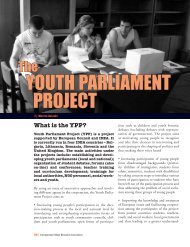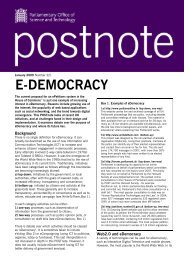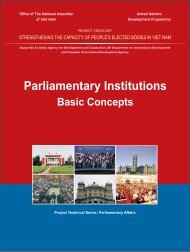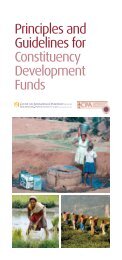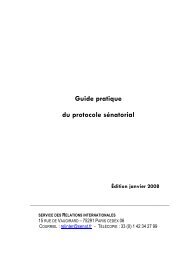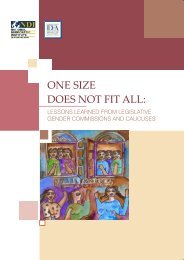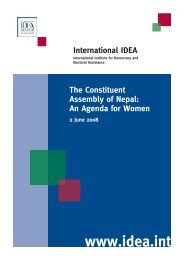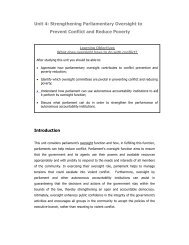Parliamentary Oversight of the Security Sector: Lessons from Ghana
Parliamentary Oversight of the Security Sector: Lessons from Ghana
Parliamentary Oversight of the Security Sector: Lessons from Ghana
You also want an ePaper? Increase the reach of your titles
YUMPU automatically turns print PDFs into web optimized ePapers that Google loves.
functions without fear or favor. 41 PAC’s performance is fur<strong>the</strong>r enhanced by <strong>the</strong> fact thatsince <strong>the</strong> Chair comes <strong>from</strong> <strong>the</strong> largest opposition group in parliament, <strong>the</strong>re is an addedincentive to check <strong>the</strong> workings <strong>of</strong> <strong>the</strong> Executive, especially to ensure that, if not for anyreasons, political points can be scored and to embarrass government. 42 Therefore “bypractice and convention, <strong>the</strong> committee has, since <strong>the</strong> establishment <strong>of</strong> <strong>the</strong> FourthRepublic, been chaired by <strong>the</strong> leader <strong>of</strong> <strong>the</strong> largest opposition party in Parliament,” 43 with<strong>the</strong> rest <strong>of</strong> <strong>the</strong> seats proportionally distributed among parties represented in Parliament.In a recent development, members <strong>of</strong> <strong>the</strong> Finance Committee have complainedabout <strong>the</strong> manner in which <strong>the</strong> Auditor-General seemingly takes instructions <strong>from</strong> <strong>the</strong>security agencies and ministers in <strong>the</strong> performance <strong>of</strong> his duties. Members <strong>of</strong> thiscommittee bemoaned such actions and decried that, “such development[s are]dangerous and inimical to <strong>the</strong> development <strong>of</strong> <strong>Ghana</strong>’s fledgling democracy and [tend] toerode confidence in <strong>the</strong> role <strong>of</strong> parliament as a watchdog <strong>of</strong> <strong>the</strong> Executive arm <strong>of</strong>government.” 44The Finance Committee deals with matters relating to finance and <strong>the</strong> economygenerally, but has <strong>the</strong> authority where “<strong>the</strong>re has arisen an urgent or unforeseen needfor expenditure … to authorize advances <strong>from</strong> <strong>the</strong> Contingency Fund to meet <strong>the</strong> needand report to Parliament.” Fur<strong>the</strong>rmore, when such an advance has been made <strong>the</strong>committee is bound to ensure that “supplementary estimates for replacement <strong>of</strong> <strong>the</strong>advance are prepared and laid before <strong>the</strong> House.” 454.2 <strong>Parliamentary</strong> <strong>Oversight</strong>: Theory versus practice 46This section examines to what extent <strong>the</strong>ory and practice converge in <strong>the</strong> performance<strong>of</strong> oversight functions by <strong>the</strong> three parliamentary committees with security oversightresponsibilities, <strong>the</strong> Defence and Interior Committee, <strong>the</strong> Finance Committee, and <strong>the</strong>Public Accounts Committee. There are several mechanisms and tools for both <strong>the</strong>standing and select parliamentary committees to exercise <strong>the</strong>ir oversight functions. Themain processes for oversight performance are through:• Questions to Ministers; 47• Motions; 4841See “<strong>Ghana</strong>: After <strong>the</strong> Public Accounts Committee Hearing - What Next?”http://allafrica.com/stories/200711010706.html, accessed 3 June, 2008.42 See <strong>the</strong> Standing Orders <strong>of</strong> Parliament that specifies <strong>the</strong> functions <strong>of</strong> this Committee, especially StandingOrder 165 (1) which stipulates that <strong>the</strong> committee must not consist <strong>of</strong> more than 25 members and is under aChairperson who does not belong to <strong>the</strong> party which controls <strong>the</strong> Executive branch <strong>of</strong> government. SeeBagbin, Alban, “The Role <strong>of</strong> <strong>the</strong> Public Accounts Committee <strong>of</strong> Parliament and how it can effectivelypromote and enforce an ethics <strong>of</strong> management in <strong>the</strong> public service,” GII Alert, 2, June 2004, 6.43 . Interview with <strong>the</strong> Head <strong>of</strong> <strong>the</strong> PAC, Accra, 15 May 2008. See also Nana Sylvanus Kumi, “MPS clashover Auditor’s report,” Daily Guide, 9 June 2008, 15. This concerned 12 reports emanating <strong>from</strong> <strong>the</strong> <strong>of</strong>fice <strong>of</strong><strong>the</strong> Auditor-General, and going back to 2005, had not been laid before <strong>the</strong> House for appropriate action.44 The Independent, ‘Auditor General takes orders <strong>from</strong> Ministers, National <strong>Security</strong>’, 13 July 2004, 3. Under<strong>the</strong> <strong>Ghana</strong>ian Constitution, <strong>the</strong> Auditor-General is required to submit its annual report on public accounts toparliament within six months <strong>of</strong> <strong>the</strong> end <strong>of</strong> <strong>the</strong> fiscal year. Sometimes reports are submitted years after <strong>the</strong>legally mandated deadline. The Auditor-General’s dependence on <strong>the</strong> executive for funding undermines itsindependence. For a comparative analysis <strong>of</strong> budgetary processes in Africa, see Budget Transparency andParticipation II: Nine African Case Studies, ed. Classens, Merrit & Albert van Zyl, (Cape Town: Africa BudgetProject, 2005).45 Standing Orders <strong>of</strong> Parliament, 169 – 170 (1) & (2), November 2000.46 This section draws on Aning, “A Comparative Analysis <strong>of</strong> <strong>Security</strong> <strong>Sector</strong> Governance in West Africa: The<strong>Ghana</strong> Case,” Fredrich Ebert Stiftung, <strong>Ghana</strong>, 2004.47 This gives opportunities to parliamentarians to question Ministers on <strong>the</strong>ir performance. Ministers havethree weeks to respond. See Standing Orders <strong>of</strong> Parliament, No. 66 (1), November 2000.8


